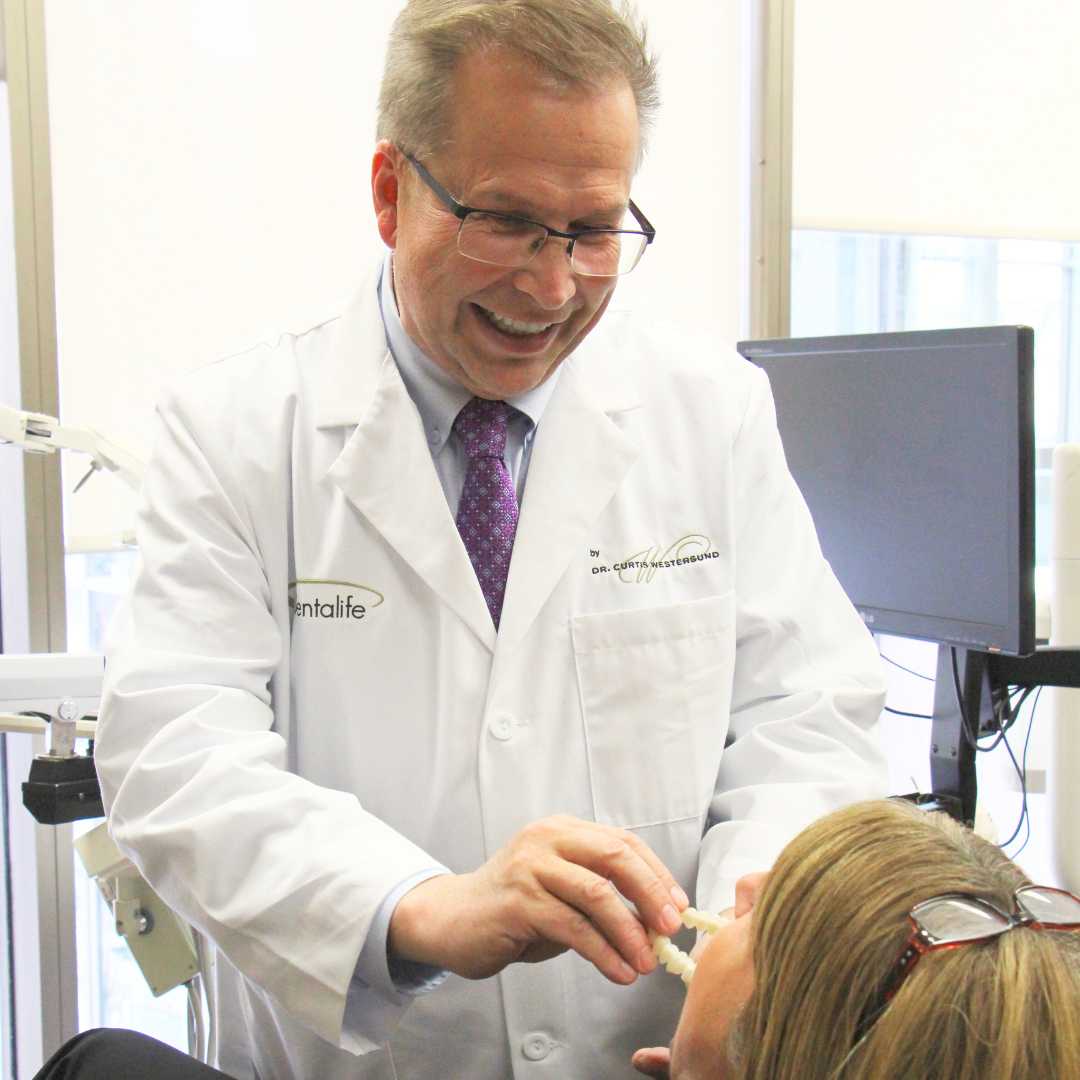Dr. Curtis Westersund, TMJ Care Practitioner at Dentalife in Calgary downtown:
“Temporomandibular joint disorder (TMJ, TMD, or TMJD) is a condition that affects the joint that connects the lower jaw to the skull. The disorder can cause a wide range of symptoms, including pain in the jaw joint and surrounding muscles, difficulty opening and closing the jaw, and a clicking or popping sound when you move your jaw. If you’re one of the millions of people who have ‘TMJ’, you may have a lot of questions about the condition and how to manage it. Here, we’ll take a closer look at some of the most common asked questions about TMJ:“
- What causes TMJ?
- What are the symptoms of TMJ?
- How is TMJ diagnosed?
- How is TMJ treated?
- Can TMJ be cured?
- Are there any self-care techniques that can help alleviate symptoms of TMJ?
- Can TMJ lead to other problems such as headaches or ear pain?
- Are there any lifestyle changes that can help prevent TMJ?
- Are there any over-the-counter medications that can help manage the symptoms of TMJ?
- Are there any surgical options for treating TMJ?
1. What causes ‘TMJ’?
The cause of ‘TMJ’ or TMD is related to a problem with the way the jaw joint functions. Some possible causes of TMJ include:
- Trauma to the jaw or head
- Chronic strain to the jaw joint due to the bite relationship.
- Clenching or grinding of the teeth (bruxism)
- Head/neck misalignment
- It’s also possible that TMJ may be caused by a combination of these factors.
2. What are the symptoms of TMJ?
The symptoms of TMJ can vary widely from person to person. Some common symptoms include:
- Pain or discomfort in the jaw joint and surrounding muscles
- A clicking or popping sound when you move your jaw
- Discomfort in opening and closing the jaw
- A sensation of the jaw being “locked” or “stuck”
- Tension Headaches around the temples,
- Pain behind or around the eyes
- Migraines
- Earaches or ringing in the ears (tinnitus)
- Chipping teeth
- Sensitive teeth
- Neck and shoulder pain
3. How is TMJ diagnosed?
- If you suspect you have TMJ, your first step should be to see your dentist or primary care physician.
- They will likely take a medical history and perform a physical examination of your jaw and head.
- They may also take X-rays or other imaging tests to get a better look at the jaw joint.
- In some cases, a dentist or oral surgeon may use a specialized imaging test called a Cone Beam Cat Scan (CBCT) to help diagnose TMJ.
- An examination of how far you can open your mouth, noting jaw joint clicking or noises, uneven jaw motions when opening and closing, and strain of jaw and neck muscles should be done.
4. How is TMJ treated?
The treatment for TMJ depends on the cause and severity of your symptoms. Some possible treatment options include:
Pain Management:
- Over-the-counter pain relievers such as Ibuprofen, Migraine medication, Drug regimes
- Counselling or psychotherapy to help manage pain and stress
- Stress management techniques such as meditation or biofeedback
TMJ Management
Physical therapy can focus on the ‘cause’ of the TMJ problem. This approach helps improve jaw mobility and reduce muscle tension.
- Restoring the balance between the teeth to promote relaxation of the jaw and neck muscles
- Improving nighttime breathing that create sleep disturbance issues
- Improve daytime breathing issues that has affected head and neck posture
- Work with healthcare professionals that can help reduce neck misalignment and body strain
- Use precision dental appliances to help stabilize jaw and neck function
5. Can TMJ be cured?
TMJ is not a disease. It is the accumulation of tooth and jaw strain. The goal of TMJ therapy or treatment is to manage causes and improve jaw function, rather than to find a ‘cure’ a disease. Management of TMJ symptoms are a varied as the number of symptoms TMJ can cause. The majority of TMJ treatments are simple and painless.
6. Are there any self-care techniques that can help alleviate symptoms of TMJ?
While there are several self-care techniques that can assist you manage a TMJ symptom, doing so may merely allow the underlying TMJ issue to worsen. Having given that warning, some of these techniques include:
- Applying heat or cold packs to the jaw
- Stretching and massaging the jaw muscles
- Avoiding hard or chewy foods that require a lot of jaw movement
- Eating soft foods that are easy to chew
7. Can TMJ lead to other problems such as headaches or ear pain?
Yes, TMJ can lead to a number of other problems, including headaches and ear pain. This is because the jaw joint and the muscles around it are connected to other structures in the head and neck, such as the temples, ears, and neck. When the jaw joint is not functioning properly, it can cause pain or tension in these other areas. Additionally, some people with TMJ may experience ear pain due to muscle tension in the jaw or to a buildup of fluid in the middle ear.
8. Are there any lifestyle changes that can help prevent TMJ?
TMJ problems often start in the first decade of life as your jaws develop. Lifestyle changes often relate to protecting the jaw from trauma. The best advice is to have a thorough examination and diagnosis for your TMJ. Remember that the absence of pain in your jaw or face does not mean an absence of problems. You can have a painless cancer and it does not mean it can be ignored. If you are diagnosed to have signs of TMJ, but you have no symptoms, have a long discussion with the appropriate healthcare provider on what can be done to prevent future problems.
9. Are there any over-the-counter medications that can help manage the symptoms of TMJ?
Masking the pain of TMJ problems may seem simple but they can allow the damage of TMJ to further deteriorate. Long term use of painkillers is not healthy.
10. Are there any surgical options for treating TMJ?
In some cases, surgery may be recommended to treat TMJ. These procedures may include arthrocentesis, arthroscopy, or open joint surgery. Surgery is only considered when all other conservative methods have been exhausted and if necessary to improve jaw function. If your symptoms persist and you have exhausted non-invasive methods, a consultation with a maxillofacial surgeon might be necessary to evaluate if surgery could be a treatment option for you.
Dr. Curtis Westersund, TMJ Care Practitioner at Dentalife in Calgary downtown:
“TMJ can be a debilitating condition, but there are a number of treatments and self-care techniques that can help manage your symptoms. If you’re experiencing jaw pain or other symptoms of TMJ, it’s important to talk to your dentist or primary care physician so you can find the right treatment plan for you. Remember, early detection and treatment can prevent complications or avoid more TMJ pain in the future. Are you suffering from a TMJ disorder? Don’t sit and wait. Take action! Schedule an appointment today.”




